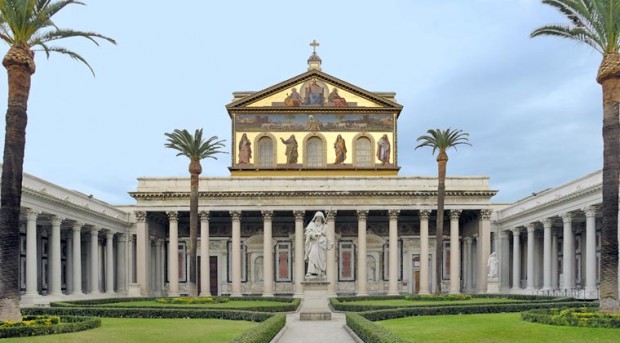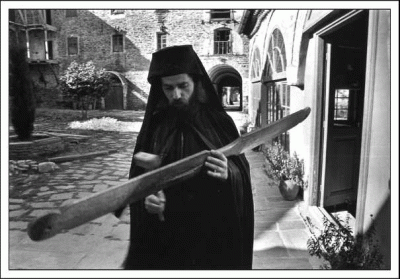Into the Ark of Salvation

Sexagesima
Three figures surround the Divine Sower of the Seed on Sexagesima Sunday. The first is Noe, the second the immaculate Mother of God, and the third Saint Paul, the Apostle. Noe points to Christ; the immaculate Mother of God gives Him to us; Saint Paul proclaims the power of the grace of Christ to all nations.
Noe and the Ark
Last evening’s Magnificat Antiphon at Vespers presented us with a preview of the lesson read this morning at Matins:
The Lord said unto Noe: The end of all flesh is come before Me, make thee an ark of planed timber, that seed of all flesh may be saved therein.
God speaks to Noe, revealing to him the means by which He intends to save “the seed of all flesh”. The ark of timber constructed by Noe foreshadows the perfect ark that is the Heart of Jesus, open to all who seek salvation. Already, today, on Sexagesima Sunday, the liturgy points ahead to the “heart” of the Passion of Saint John that will be chanted on Good Friday: “But one of the soldiers with a spear opened his side, and immediately there came out blood and water” (John 19:34). Later in the year, at Matins on the feast of the Sacred Heart of Jesus, we will sing of the same mystery:
O wounded Heart, whence sprang
The Church, the Saviour’s bride;
Thou Door of our Salvation’s Ark
Set in its mystic side.
The seed of all flesh, that is, life itself, was preserved within the ark. At the same time, the seed of life is sown in the wide field of the world that was created to receive it. Our Lord Jesus Christ is Himself the Sower who comes out from the Father, His Sacred Heart full of the seed of divine life. The seed that He sows is His word. In sowing the seed, Christ sows Himself, for He says, «I am the life» (John 14:6) and, again, «I am come that they may have life, and may have it more abundantly: (John 10:10).
We sang at the Benedictus this morning:
When much people were gathered together to Jesus, and were come to Him out of every city, He spoke by a parable: A sower went out to sow his seed.
 Gathered Unto Jesus
Gathered Unto Jesus
«Much people were gathered together to Jesus». If you would hear the word of Jesus, you must first allow yourself to be gathered to Him; this gathering unto Christ is the work of the Holy Ghost calling souls into the ark of salvation. Every soul docile to the inspirations of the Holy Ghost will hear the sound of the Divine Symandron. The symandron is a plank of wood struck with a hammer; it is used in Orthodox monasteries to call the monks to prayer, and was invented in the 14th century when, a Muslim edict forbade the ringing of church bells. Monks, being steeped in the images of Sacred Scripture, were quick to recognise in the hammering of the symandron an echo of Noe’s hammer striking against the wood of the ark during its construction. «Come now. Come in. Come quickly. Come now. Come in. Come quickly. Come now. Come in. Come quickly». Persistently, the Holy Ghost summons souls into the ark that is the Heart of Jesus.
The Father draws souls to the Heart of the Son by the secret operations of the Holy Ghost; similarly the Father teaches us inwardly by the Holy Ghost.
But when he, the Spirit of truth, is come, he will teach you all truth. For he shall not speak of himself; but what things soever he shall hear, he shall speak; and the things that are to come, he shall shew you. He shall glorify me; because he shall receive of mine, and shall shew it to you. (John 16:13–14)
The Immaculate Heart of Mary
The soul who receives the seed of the word, conceives Jesus inwardly, becoming, like the Virgin of the Annunciation, a mother by the overshadowing of the Holy Ghost, according to what Our Lord says in the sequel to today’s Gospel: “My mother and my brethren are they who hear the word of God, and do it” (Luke 8:21).
In the Mectildian–Benedictine calendar, February 8th, is the feast of the Most Pure Heart of Mary. The date was aptly chosen in the 17th century in relation to February 2nd, on which day we read Simeon’s prophecy [Luke 2:35] concerning the Heart of the Mother of God: “And thy own soul a sword shall pierce, that, out of many hearts, thoughts may be revealed”.) The Most Pure Heart of Mary emerges from the proper texts of Sexagesima Sunday in a wonderful way. Not only is Our Lady’s Heart, like Noe’s ark, the refuge of sinners; her immaculate Heart is the “good ground” of the Gospel. Thus do we sing every morning in Psalm 66 at the beginning of Lauds, making reference to the Mother of God, Terra dedit fructum suum, “The earth hath yielded her fruit” (Psalm 66:7).
At Terce we sang, «They who keep the word of God with a good and perfect heart, bring forth fruit in patience». What is this good and perfect heart prepared for the divine seed if not the immaculate Heart of Mary? It is by turning to Mary, by spending time in her presence, by listening to the Word of God with her, by reading it through her eyes, and by chanting it in harmony with her Heart, that the divine seed becomes wonderfully fruitful in us. «Some seed fell on good ground, and bare fruit, some one hundred-fold, and some sixty-fold».
Saint Paul
We have considered Noe, we have looked to the Immaculate Heart of Mary; it remains for us to turn to Paul, the Apostle of the Nations. Sexagesima Sunday is, in a very real sense, a kind of feast of Saint Paul, coming, as it does, in the afterglow of the feast of his Conversion on January 25th. The Roman stational church today is Saint Paul–Without–the–Walls, a basilica dear to all Benedictines and sanctified in modern times, by the presence of two holy monks: Blessed Cardinal Ildephonsus Schuster and Blessed Placid Riccardi, and by an Oblate, the Venerable Itala Mela. The Collect of the Mass and Office asks that we be protected by the Doctor of the Gentiles against all adversity, and the Epistle is a long account Saint Paul’s apostleship. He concludes by revealing to all of us and to the Church universal the very words spoken to him by Our Lord: «My grace is sufficient for thee; for power is made perfect in infirmity» (2 Corinthians 12:9).
Few among us have the sturdy faith and persevering obedience of Noe. The best of among us, receiving the divine seed, dare hope, by the prayers of the Mother of God, to attain to a yield of sixty–fold. For most of us, the better part of the seed falls, alas, upon rock and amidst thorns. For this reason, I think we are given Saint Paul today:
Gladly, therefore.will I glory in my infirmities, that the power of Christ may dwell in me. For which cause I please myself in my infirmities, in reproaches, in necessities, in persecutions, in distresses, for Christ. For when I am weak, then am I powerful. (2 Corinthians 12:9–10).
Infirmity and weakness constitute no obstacle to a fruitful hearing of the Word of God. For the seed of the Word sown in a humble heart bears within it the medicine for every infirmity and grace to heal every weakness. If, in this first part of Holy Mass and in the Divine Office, we have received the life–giving seed; in the second part of Holy Mass — the Sacrifice — the Fruit of that seed, the blessed Fruit of the Virgin’s womb, is made present upon the altar and, then, given us in Holy Communion. To each of us Christ Jesus comes, saying this morning as once to the Apostle, «My grace is sufficient for thee; for power is made perfect in infirmity» (2 Corinthians 12:9). With these words, we can look forward to a holy Lent and to the glory of the Resurrection.
